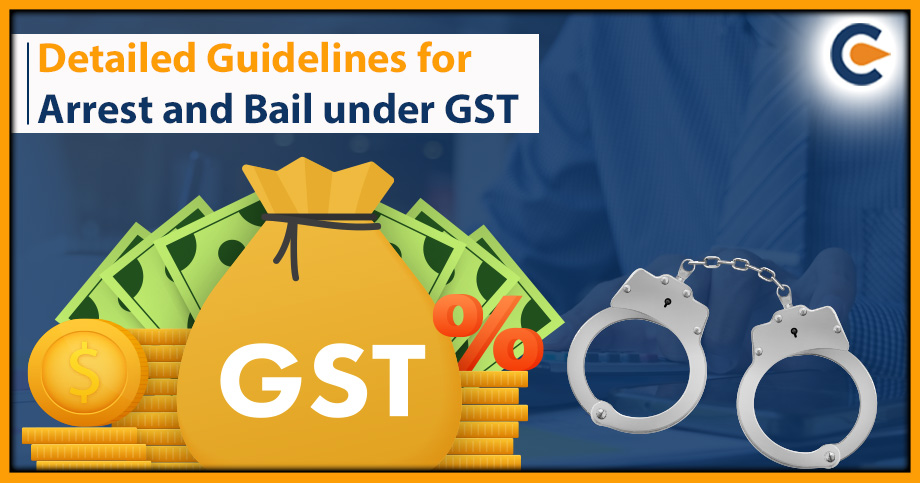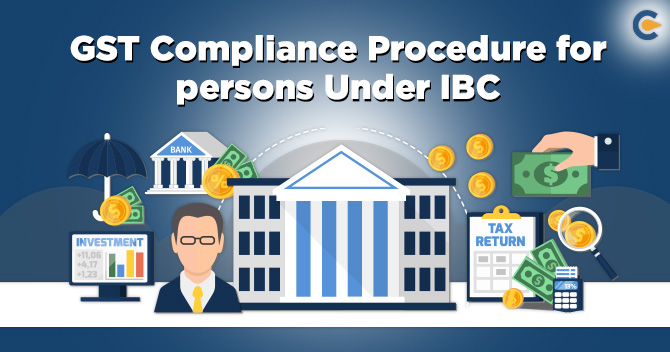Under the Goods and Service Tax (GST) regime, there are provisions for arrest and bail similar to other tax legislations. The arrest provisions apply in cases of tax evasion or fraud where the amount involved exceeds a specific limit. An authorized officer may make an arrest and take the person into custody in such circumstances. On the other hand, bail provisions allow for the release of the arrested person upon furnishing a bond with or without surety. The purpose of the bail requirements is to guarantee that the accused person shows up in court on the specified trial dates. It’s crucial to remember that these laws are only applied as a last resort and only after due investigation and consideration of all pertinent factors. In this article, we will discuss guidelines for Arrest and Bail under GST.
What are Goods and Service Tax (GST)?
The Goods and Service Tax (GST) is an indirect tax on the supply of goods and services in India. It is a multi-stage, location-based tax levied at every level of the supply chain, from manufacturing to consumption. The Goods and Service Tax (GST) replaces multiple indirect taxes collected by the national and state governments. Goods and Service Tax (GST) is seen as an essential change in the Indian Tax System since it streamlines the tax structure, removes tax cascading and encourages economic growth by lowering the tax burden on businesses.
The Goods and Service Tax (GST) has created a common market for goods and services across India, making it simple for businesses to operate across state lines. The GST has helped in making the tax system more transparent and fair. The GST has also benefited consumers by lowering the price of products and services due to the reduction in the tax burden on companies. This has resulted in greater purchasing power and increased demand, propelling economic expansion.
What is the Meaning of Arrest and Bail?
Let’s discuss the meaning of Arrest and Bail:
- Arrest: “Arrest “refers to an act of bringing a person into custody by a law enforcement officer or authorized authority. An arrest is made to bring a person before a court or other competent authority to address charges of criminal activity or to keep them from committing more crimes. In most jurisdictions, an arrest can only be made if there is probable cause to believe that the person has committed a crime. This implies that arresting officers must have proof or information to support the belief that the person has committed a crime. An arrest can also be made with a warrant issued by a judicial authority, which provides the basis for the arrest.
In R.R. Chari v. State of Uttar Pradesh, the act of being taken into custody in order to be formally charged with a crime was described by the Supreme Court as an arrest. The court pointed out that, in a constitutional sense, it refers to the seizure of a person (body of a person).
It should be noted that the right to make an arrest is subject to strict rules and guidelines, and any infringement of a person’s rights during the arrest procedure can result in legal repercussions. An arrest’s objective is to bring someone to justice and enforce laws, but it must be done in a fair and constitutional manner.
- Bail: Bail is a legal process that permits someone who has been arrested and charged with a crime to be temporarily released from custody while they await trial. Bail is basically an assurance to the court that the accused will attend all needed court proceedings and not abscond. In exchange for the assurance, the accused is typically released from custody upon payment of a certain specified amount. This amount is known as a bail bond. Bail is intended to provide a fair balance between the interests of the accused and the interests of society. On the other hand, it allows the accused to be released from custody, protecting their freedom and enabling them to prepare a defence and attend to personal and professional duties. It gives the court and society some certainty that the accused will appear for trial and not participate in further criminal activity while on parole.
Bail can be set at a fixed sum in certain circumstances, but in others, the judge may consider criteria such as the accused’s criminal history, the nature of the offence and the risk of fleeing when determining the amount of bail.
Central Goods and Service Act of 2017 (CGST)
The CGST is an indirect tax levied by the government of India. The Central Goods and Service Act of 2017[1] (CGST) was adopted in India as a part of the Goods and Services Tax (GST) reform, with the goal of simplifying the indirect tax system and making it simple for businesses. The tax is levied on all infra-state supply of goods and services and is governed by the CBIC.
Section 69 and 132 of the Central Goods and Services Tax Act of 2017 (CGST)
Section 69 of the CGST Act 2017 states the powers to arrest a person. While section 132 states the offences for which a person can be eligible for arrest.
Section 69 of the Central Goods and Services Tax Act of 2017 (CGST)
Section 69 (1) – This section states that if any person has committed an offence specified in:
- Section 132(a) – which is to supply any goods or services without the issuance of any invoice, with the intention of evading tax,
- Section 132(b) – which is issuing of invoice or bill or both without any supply of goods or services, which will lead to wrongful availment or use of Input Tax Credit (ITC) or Tax Refund,
- Section 132(c) – has availed Input Tax Credit (ITC) through the invoice or bill which is referred above (Section 132(b)), or has fraudulently availed Input Tax Credit (ITC) without any bill or invoice,
- Section 132(d) – or has collected a certain amount as tax but has not paid the government, beyond the period of three months, from the date on which it was due.
Section 69(2) – when a person is arrested for any of the above-mentioned offences, then the authorized person (central tax officer) will inform the person about the arrest and all the grounds of the arrest and shall present the person before the magistrate within twenty-four hours.
Section 69(3) – it states that when a person if a person is arrested for an offence specified in section 132 (4), then such person shall be admitted to bail or in default bail. This person shall then be forwarded to the magistrate’s custody. If the offence is a non-cognizable offence and is a bailable offence, then the assistant commissioner of the deputy commissioner will have the same power as a charge of the police officer for the purpose of bail or releasing the arrested person.
Guidelines for Arrest and Bail under GST in relation to offences which are punishable under the CGST
The Supreme Court made various observations after the case of Siddharth v/s State of Uttar Pradesh; the Central Board of Indirect Taxes and Customs (CBIC) issues a set of guidelines on arrest and bail under the Goods and Services Tax Act (GST Act).
The Supreme Court stated that personal liberty is a fundamental component of our constitutional duty. The need to arrest an accused during an investigation occurs when a requirement of custodial investigation is there, or it is a heinous crime, or there is a possibility that the accused may abscond, or there is a chance of influencing the witnesses. The fact that the arrest can be made because it is legal does not imply that an arrest must be made. There must be a difference drawn between the existence of the authority to arrest and the rationale for using it. If arresting becomes common, it can do irreparable harm to a person’s reputation and self-esteem. If the investigating officer has no grounds to believe that the accused will flee or defy summons and has, in fact, cooperated with the inquiry throughout, then there should not be any compulsion on an officer to arrest the accused.
Following are the guidelines issued by CBIC in respect of arrest and bail under the GST Act:
- Conditions before arrest:-
- The legal requirements must be fulfilled before an arrest is made. The reason to believe must be unambiguous for placing an offender under arrest. There should be the presence of credible material on which the reasons for arrest are based.
- It is said that as the arrests violate a person’s personal liberty, the authority to arrest should be used very carefully and with caution. The arrest must not be performed mechanically or routinely.
- If all the conditions before the arrest are fulfilled according to Section 132 of the CGST Act, 2017, it is not implied that the arrest must be made. When the legal elements of the offence are established, the responsible authority must evaluate whether the response to any or all of the questions listed below is in affirmative –
a. Presence of reasonable suspicion, or presence of credible information or if the offence is non-bailable;
b. The arrest is necessary for the proper investigation of the offence; The person, if not restricted, may tamper with the process of further investigation or may tamper any evidence or influence or intimidate any witnesses;
c. The accused is a mastermind or primary operator behind the Benami transactions in the name of dummy GSTIN or non-existent people in order to pass fraudulent input tax credit etc.; d. Unless the person is arrested, his attendance before the investigation officer cannot be guaranteed.
- Only when the intent to evade tax or perform activities resulting in the availment or use of wrongful input tax credit or fraudulent tax refund to pay the collected amount as tax is clear, then only permission to arrest can be given. Apart from satisfying the legal elements, the factors before the arrest is made should be that adequate investigation is carried out and the possibility of the evidence being tampered with is prevented.
- The arrest, according to the standards, should not be made in cases of technical nature. Such cases include when the tax demand is based on a difference of opinion about how the legislation should be interpreted. The prevalent assessment procedure might be one of the decisive criteria for attributing tax evasion to the alleged offender.
- Some other factors that are influenced when a decision to arrest a person are where the accused cooperated with the investigation are, in compliance with the summons, produced all the documents which were called for, voluntarily pays the tax payment and did not give evasive replies etc.
- Procedure after Arrest
- The reason to believe is to be recorded by the commissioner after he has considered the nature of the offence, the person’s role and the evidence as stated in section 132(4) of the CGST Act. The central tax officer can be given the authority to arrest such a person;
- The provisions of section 69 (3) of the CGST Act, read with Criminal Procedure Code, should be adhered to in relation to the arrest and its procedure;
- The compliance of the memo of arrest with the Supreme Court directions in the case of DK Basu v/s State of West Bengal should be there;
- All the relevant sections of the CGST Act or any other laws attracted to the particular case and the person arrested should be indicated in the arrest memo.
- The person must be told the grounds on which he is arrested and is to be mentioned in the memo of arrest;
- The arrested person’s nominated or authorized person must be immediately informed;
- The arrest memo should consist of the date and time of the arrest made. The arrested person should be provided with the arrest memo, with proper acknowledgement;
- Arrest memo should be separately made and given to the arrested person;
- Document identification numbers must be generated and quoted in each communication given by CBIC to taxpayers.
- Certain modulates must be complied with:
- A woman officer will only arrest a woman;
- The arrested person’s medical examination can only be done by a medical officer serving the central or state government. If the medical officer serving the central or state government is not present, then a registered medical practitioner can examine. This should be done immediately after the arrest;
- A female medical officer will supervise an examination of a female person; if not present at that time, then a female medical practitioner;
- The custodian has the duty to take reasonable care of the health and safety of the person taken in custody;
- Arrests should be made with minimal force and without any violence.
- Post arrest formalities
- When a person is arrested under section 69(1) of the CGST Act for the offence mentioned in section 132 of the CGST Act, the person can be released on bail against a bail bond by the assistant or deputy commissioner.
- The arrested person and his nominated or authorized person must be informed about the bail conditions in writing.
- The permission to talk to the nominated person should be given to the arrested person.
- The person must inform the officer before leaving the country; the presence before the investigation officer would be some of the conditions of bail, along with the signing of a personal bail bond and one surety which is to be provided by a reputable local.
- The facts and circumstances of the case will determine the amount of personal bail bond and surety.
- The amount of bail bond surely must not be excessive and should be in correspondence with the financial status of the person arrested.
- When all the bail conditions are fulfilled, then such a person can be released on bail by the officer concerned. If the conditions are not fulfilled, then such an arrested person should be appeared before the magistrate within twenty-four hours without any delay. The person can be shifted to the nearest police station if required.
- When a person is arrested under section 69(1) of CGST Act for the offence under section 132(5), then the officer authorized shall inform the person of their grounds of arrest and present them before the magistrate within twenty hours, exclusive of the time which is required to travel from the place of arrest to the court of the magistrate.
- The document format, such as the bail bond in the CrPc and the challan for handing over to the police, must be followed.
- If no bail is granted, then to file a prosecution case under section 132 before the competent court within sixty days.
- A bail register is to be maintained by all commissioners and directorates, with all the case details, details of the person arrested, the amount of bail and surety etc. The documents or the money or instruments received as surety must be kept in safe custody by a nominated person.
Conclusion
Goods and Service Tax (GST) is a key reform that has transformed the indirect tax landscape in India. It has simplified the tax system, decreased the tax burden and established a national market for goods and services. The GST has proven to be economic development stimulation. Bail under GST is subject to specific restrictions and limitations, but it remains a fundamental right for anyone accused of a crime. It is essential for individuals and businesses to understand these provisions and the guidelines for arrest and bail under GST so that they can be well-prepared in case of any legal proceedings.
Read Our Article: GST Online Registration Process: A Complete Guide











